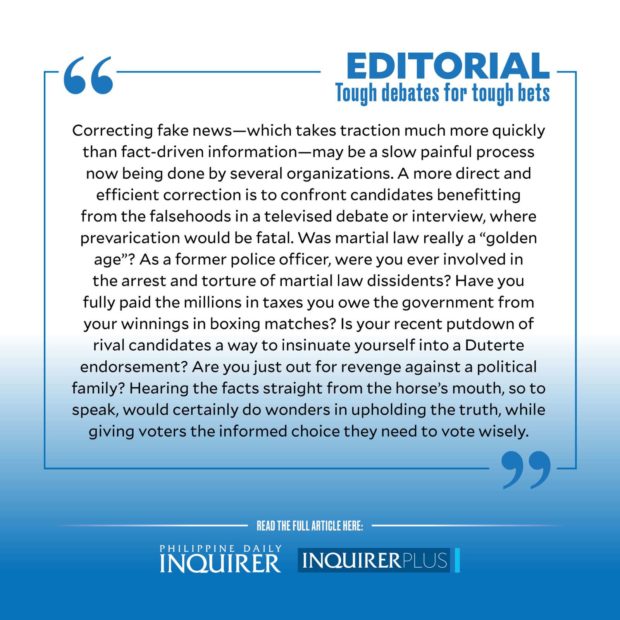Tough debates for tough bets
Remember that 2016 presidential debate when one candidate fiercely vowed to ride a jet ski to one of our islands being claimed by China, to plant the Philippine flag on it?
Years later, amid China’s escalating aggression on disputed territories, people demanded that the now-elected official redeem his election promise. To which he snorted: “’Yung bravado ko was just a pure campaign joke!” How “stupid” of listeners to believe it, he added during his weekly address in May 2021.
Some people might take that incident as proof that televised debates and interviews are nothing but entertainment, a lightweight platform that gives candidates free airtime to grandstand, smear their rivals, and just plain lie. Just a lot of sound and fury signifying nothing. And depending on whether the interviewer shares the candidate’s version of past events, such glamorized on-air interrogation shows how “biased” mainstream media can be, as claimed by supporters of some candidates.
Article continues after this advertisementNaysayers might add: What’s the point of going live on TV when one can just as easily livestream one’s carefully-packaged agenda and political plans via social media, with TikTok and YouTube videos racking up millions of views within hours?
Other skeptics accuse TV networks of ramping up their ratings by having candidates battle it out onscreen, while collecting ad revenues in the process. So why help them promote such negativity?
First, because candidates running in the crucial national elections that may determine the country’s fate in the next six years need to prove themselves equal to the herculean task by clearly stating and defending their stand on issues through widely-viewed debates and interviews.
Beyond generic and motherhood statements, beyond those idyllic political ads that paint candidates as infallible saviors, voters need to hear details of their platforms and concrete plans to address the country’s perennial problems, among them a pandemic-battered economy, unabated corruption, and the West Philippine Sea crisis. Just how feasible, how realistic are these plans? Can the candidate’s agenda withstand public scrutiny and probing questions in a debate or interview? With political handlers beyond reach, can the candidate articulate the vision that drives this quest for political power?
A candidate’s reaction to impromptu questions in an interview also reveals much more than scripted speeches, social media memes, and well-groomed public appearances can. Television can be a cruel and intimate medium, bringing into our living room live closeup shots of a candidate’s every sigh, tic, blink, grimace, or awkward silence. Does his or her answer sound sincere or PR-polished? Did he stutter or ramble on? Did she look away? Even choice of words reveals background, personality, attitude.
It may be unfair, but catching candidates in their unguarded moments may be more telling than their resumé, inadvertently showing viewers their character, values, and priorities, and how they’d handle pressure. How he or she reacts to adversarial questions could very well reflect how the candidate deals with future crises as the country’s leader. The presidency is a tough job, and tough questions test the candidate’s mettle.
And then there’s fake news. A Social Weather Stations survey conducted last December showed that 51 percent of adult Filipinos found it difficult to tell fake news in traditional and social media. Unfortunately, social media is the default choice of the young who, according to data from the Commission on Elections, comprises 52 percent of registered voters. While social media is free and accessible, its very nature has led to it being abused and becoming the roosting ground of paid trolls who brazenly post fake news under the mantle of anonymity.
With trolls using photo-editing techniques and attention-grabbing videos on TikTok and YouTube, social media has managed to widely disseminate malicious disinformation calculated to ruin some candidates’ chances at the polls. Aside from the youth, most vulnerable to this manipulation of public perception are those who distrust mainstream media and rely mainly on social media for information.
Correcting fake news — which takes traction much more quickly than fact-driven information — may be a slow painful process now being done by several organizations. A more direct and efficient correction is to confront candidates benefitting from the falsehoods in a televised debate or interview, where prevarication would be fatal. Was martial law really a “golden age”? As a former police officer, were you ever involved in the arrest and torture of martial law dissidents? Have you fully paid the millions in taxes you owe the government from your winnings in boxing matches? Is your recent putdown of rival candidates a way to insinuate yourself into a Duterte endorsement? Are you just out for revenge against a political family?
Hearing the facts straight from the horse’s mouth, so to speak, would certainly do wonders in upholding the truth, while giving voters the informed choice they need to vote wisely.

















